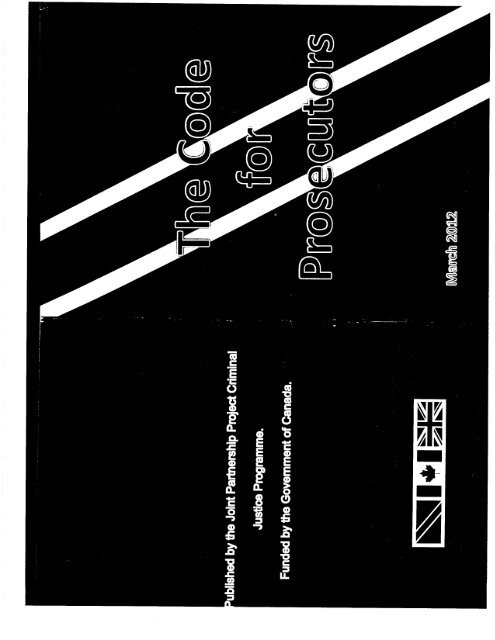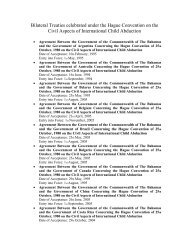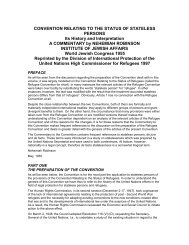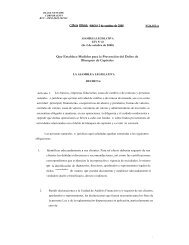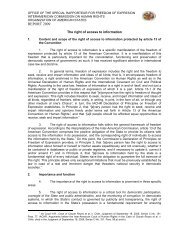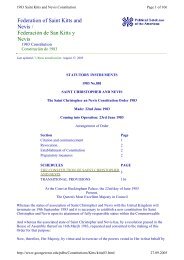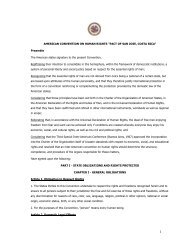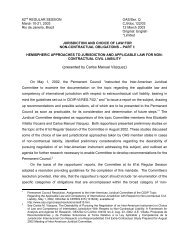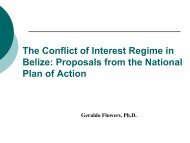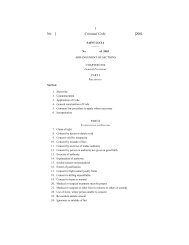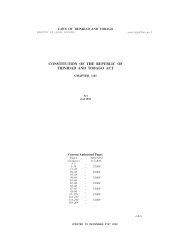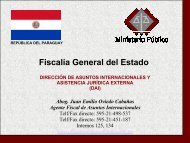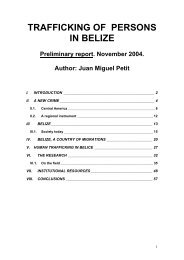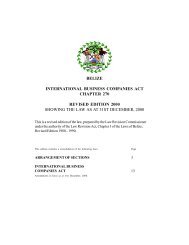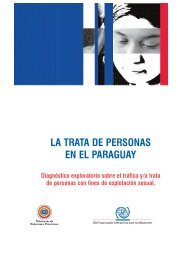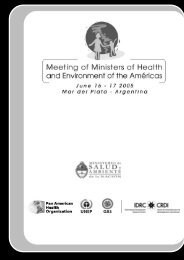Code for Prosecutors - OAS
Code for Prosecutors - OAS
Code for Prosecutors - OAS
You also want an ePaper? Increase the reach of your titles
YUMPU automatically turns print PDFs into web optimized ePapers that Google loves.
ubiished by the Joint Partnership Project Criminal<br />
Justice Programme.<br />
Funded by the Government of Canada.<br />
1
<strong>Code</strong> <strong>for</strong> <strong>Prosecutors</strong> - Trinidad and Tobago<br />
Message from the DPP<br />
The decision of whether or not to prosecute an individual is a most important<br />
one. It is vital <strong>for</strong> the suspect, vital <strong>for</strong> the victim and vital <strong>for</strong> the community<br />
as a whole. Great care must always be taken by those who decide these issues,<br />
always remembering that wrong decisions may destroy lives and undermine<br />
confidence in the criminal justice system. A decision to prosecute should only<br />
be taken after the evidence and the surrounding circumstances have been fully<br />
considered. Those who prosecute discharge a heavy responsibility on behalf<br />
of the community. The modern prosecutor is expected to discharge his or<br />
her duties with professionalism, skill and vision, and to operate within the<br />
parameters of defined and clear prosecution policy guidelines.<br />
The modern prosecutor is expected to have and to display several qualities<br />
including good judgment, integrity and a keen sense of fair play. Fearlessness<br />
is also an essential quality, <strong>for</strong> prosecution decisions are often controversial<br />
and the prosecutor must have the strength of character to resist criticism from<br />
whatever quarter. No matter how strident or painful. The judgment of the<br />
prosecutor on a case must never be overborne by political, media or public<br />
pressure. The profession of prosecutor is an honourable one but is not <strong>for</strong> the<br />
faint-hearted.<br />
The prosecutor occupies a <strong>for</strong>midable position in the administration of criminal<br />
justice. The decisions taken may profoundly affect the lives of others. In<br />
each case, the prosecutor must carefully evaluate the evidence and apply the<br />
law and decide if a prosecution is appropriate. The prosecutorial discretion<br />
should be exercised in a manner that is consistent, fair and objective. Difficult<br />
decisions must be confronted, not be side-stepped, and in deciding the way<br />
<strong>for</strong>ward the prosecutor will apply professional judgment, legal competence<br />
and practical life experience.<br />
The prosecutor is as independent as the judge, and his or her interest throughout<br />
is the just disposal of the issues. Rightly has it been said that the prosecutor<br />
secures no victories and sustains no defeats. This does not mean that the<br />
prosecutor should not firmly present the prosecution case, or use <strong>for</strong>ensic skills<br />
to test the defence case.<br />
The prosecutor should be vigorous in presenting the evidence, but restrained<br />
and courteous. Evidence should be properly marshaled and cogently adduced.
<strong>Code</strong> <strong>for</strong> <strong>Prosecutors</strong> - Trinidad and Tobago<br />
Without a fair prosecutor, there cannot be a fair trial. He or she may strike hard<br />
blows, provided they are not foul ones. The community has a vested interest<br />
in the proper conduct of its prosecutions, and the conviction of the guilty just<br />
as much in the public interest as is the acquittal of the innocent.<br />
It has never been the position that those suspected of criminal offences must<br />
automatically be prosecuted. A charge is only ever appropriate if it is in the<br />
public interest to bring it. In deciding where exactly the public interest lies in<br />
a particular case the prosecutor must consider the justice of the situation and<br />
examine all the factors. These vary from case to case and the application of the<br />
prosecution discretion is not an exact science. The prosecutor does not operate<br />
as a rubber stamp, and it would not be right to prosecute every case without<br />
regard to the interests of justice. In general, the more serious the offence, the<br />
more likely is it that the public interest will require a prosecution to proceed.<br />
The prosecutor is guided at all times by the public interest in the measured<br />
application of the rule of law. The prosecutor exercises an important discretion<br />
on behalf of the public (of whether or not to institute a prosecution of a<br />
suspect,) and how to conduct a prosecution once it has begun. There is a need<br />
to maintain public confidence in the administration of criminal justice, and the<br />
community has a legitimate interest in the work of its prosecution service. The<br />
purpose of The <strong>Code</strong> <strong>for</strong> <strong>Prosecutors</strong> is there<strong>for</strong>e not only to provide a code<br />
of conduct <strong>for</strong> prosecutors and to promote consistent decision making at all<br />
stages of the prosecution process, but also to make the community aware of the<br />
way in which the system of public prosecutions operate. Principled criteria are<br />
applicable at all times, and the people of Trinidad and Tobago need to be able<br />
to see <strong>for</strong> themselves what exactly these are. Transparency is essential <strong>for</strong> the<br />
modern prosecutor <strong>for</strong> a fair and effective criminal justice system.<br />
<strong>Code</strong> <strong>for</strong> <strong>Prosecutors</strong> - Trinidad and Tobago<br />
CONTENTS<br />
1. Introduction<br />
2. Application of the <strong>Code</strong><br />
3. The Role and Ethics of the Prosecutor<br />
4. The Impartiality of the Prosecutor<br />
5. The Prosecutor, Police and Other Investigators<br />
6. Decision Making<br />
7. The Full <strong>Code</strong> Test<br />
8. Reopening a Prosecution Decision<br />
9. Selection of Charges<br />
10. The Consent to Prosecute<br />
11 Youth Offenders<br />
12. Accepting Guilty Pleas<br />
13. Bail<br />
14. Trial Fairness<br />
15. The Role of the Prosecutor in the Sentencing Process<br />
16. Proceeds of Crime<br />
17. Victims and Witnesses<br />
18. Appeals<br />
19. The Prosecutor and the Media
<strong>Code</strong> <strong>for</strong> <strong>Prosecutors</strong> - Trinidad and Tobago<br />
1. Introduction<br />
1.1 The Office of the Director of Public Prosecutions (ODPP) is the principal<br />
public prosecution authority <strong>for</strong> Trinidad and Tobago and it is headed by<br />
the Director of Public Prosecutions (DPP).<br />
Section 90 (3) of the Constitution states:<br />
The Director of Public Prosecutions shall have power in any case in<br />
which he considers it proper to do so -<br />
a) to institute and undertake criminal proceedings against any<br />
person be<strong>for</strong>e any Court in respect of any offence against the<br />
law of Trinidad and Tobago;<br />
b) to take over and continue any such criminal proceedings that<br />
may have been instituted by any other person or authority;<br />
c) to discontinue at any stage be<strong>for</strong>e judgment is delivered any<br />
such criminal proceedings instituted or undertaken by himself<br />
or any other person or authority.<br />
1.2 The DPP is responsible <strong>for</strong> the issuance of a <strong>Code</strong> <strong>for</strong> <strong>Prosecutors</strong> (the<br />
<strong>Code</strong>). The <strong>Code</strong> gives guidance to prosecutors on general principles to<br />
be applied when making decisions about prosecutions.<br />
1.3 In this <strong>Code</strong>, the term, "prosecutors" is used to describe members of<br />
the ODPP who exercise their powers in accordance with the instructions<br />
issued by the DPP and Police Officers designated by the Commissioner<br />
of Police and anyone authorised by the DPP to prosecute in any court.<br />
1.4 In this <strong>Code</strong>, the term, "suspect" is used to describe a person who is<br />
not yet the suspect of criminal proceedings; the term, "defendant" is<br />
used to describe a person who has been charged or summonsed; the<br />
term, "offender" is used to describe a person who has admitted his or her<br />
guilt to a police officer or other investigator or prosecutor, or who has<br />
been found guilty in a court of law; and the term, "appellant" is used to<br />
describe a person appealing a conviction and/or sentence. The <strong>Code</strong> lets<br />
the public know what prosecutors do; how they make their decisions;<br />
<strong>Code</strong> <strong>for</strong> <strong>Prosecutors</strong> - Trinidad and Tobago<br />
and the level of service that the ODPP is committed to providing in key<br />
aspects of its work.<br />
1.5 Prosecution means all aspects of a criminal prosecution and includes precharge<br />
advice, the decision to prosecute, the decision to stop a prosecution,<br />
the decision to re-charge and proceedings ancillary to a prosecution, <strong>for</strong><br />
example, <strong>for</strong>feiture, restraint and confiscation.<br />
2. Application of the <strong>Code</strong><br />
2.1 The <strong>Code</strong> is not an instruction manual <strong>for</strong> prosecutors, nor does it<br />
necessarily cover every decision that must be made by prosecutors,<br />
police or other investigators. The <strong>Code</strong> does not purport to lay down any<br />
rule of law. However, as the <strong>Code</strong> reflects the aspirations and practices of<br />
prosecutors who adhere to the International Association of <strong>Prosecutors</strong><br />
Standards (1999), it is the expectation that all prosecutions in Trinidad<br />
and Tobago will be conducted in accordance with the guidelines outlined<br />
in the <strong>Code</strong>.<br />
3. The Role and Ethics of the Prosecutor<br />
3.1<br />
The prosecutor occupies a powerful and privileged position. The<br />
decisions the prosecutor takes may profoundly affect the lives of others.<br />
A prosecution must only be brought <strong>for</strong> good cause. No one should ever<br />
be prosecuted simply because he or she may have committed an offence.<br />
3.2<br />
The decision whether to prosecute is among the most important decisions<br />
the prosecutor has to make. Great care must be taken in each case to<br />
ensure that the right decision is made. A wrong decision to prosecute,<br />
as well as a wrong decision not to prosecute, may have the potential to<br />
undermine public confidence in the criminal justice system. There is little<br />
margin <strong>for</strong> error.<br />
3.3<br />
When at court, the prosecutor must at all times act independently. In the<br />
discharge of the prosecution function the prosecutor is as independent<br />
as the judge. The interest of the prosecutor at all times is to assist the<br />
court to achieve justice. A fair trial is one in which all relevant evidence<br />
is presented, tested and adjudicated upon according to law. As the<br />
representative of the public interest the prosecutor must guard against the
<strong>Code</strong> <strong>for</strong> <strong>Prosecutors</strong> - Trinidad and Tobago<br />
conviction of the innocent. The prosecutor should:<br />
Ensure that the prosecution's case is firmly and fairly put;<br />
Vigorously test the defence's case, but with courtesy and<br />
temperately;<br />
Avoid submissions of fact or law which are not soundly based;<br />
Prevent prejudice or emotion in the conduct of the case;<br />
Reveal the existence of material that may assist the accused;<br />
Invite the court to stop the proceedings if the point is reached at<br />
which he or she concludes there is no longer a reasonable prospect<br />
of conviction. Such a decision should only be made on the advice<br />
of the DPP or someone delegated by him to act on his behalf <strong>for</strong><br />
this specific purpose.<br />
Use all legitimate means to achieve a just disposal of the issues in<br />
contention.<br />
3.4 In a complex case, the prosecutor must fully marshall the evidence prior<br />
to trial. This makes the case both manageable and comprehensible.<br />
3.5 The prosecutor acts independently, yet in the public interest. The prosecutor<br />
will wish to present a case on the basis of evidence which is cogent and<br />
credible. The duty of the prosecutor is not to obtain a conviction at all<br />
costs, but to place be<strong>for</strong>e the court the evidence relevant to the alleged<br />
crime. The prosecutor should not express a personal opinion as to the<br />
guilt or innocence of the accused, or as to the credibility of a witness.<br />
4. The Impartiality of the Prosecutor<br />
4.1 The prosecutor must be fair, independent and objective. Recognised<br />
prosecutorial criteria must be applied at each stage of the decision-making<br />
process. A decision of whether to prosecute must not be influenced by:<br />
The personal feelings of the prosecutor concerning the offence,<br />
6<br />
<strong>Code</strong> <strong>for</strong> <strong>Prosecutors</strong> - Trinidad and Tobago<br />
the suspect or the victim;<br />
The possible effect of the decision on the personal or professional<br />
circumstances of those responsible <strong>for</strong> the prosecution or otherwise<br />
involved in its conduct;<br />
The race, religion, sex, national origin or political associations,<br />
activities or beliefs of the suspect or any other person involved;<br />
Possible political advantage or disadvantage to the government or<br />
any political party, group or individual.<br />
5. The Prosecutor and Police and other Investigators<br />
5.1 The functions of the prosecutor and the police and other investigators are<br />
separate and distinct. The prosecutor decides if a prosecution should be<br />
pursued and, if so, on what terms. He or she acts independently of those<br />
responsible <strong>for</strong> the investigation. Whilst the prosecutor may consider<br />
the views of the investigator where appropriate, in the end it is the<br />
responsibility of the prosecutor to decide whether or not to proceed.<br />
5.2 The roles of the prosecutor and the investigator are interdependent. Whilst<br />
each has separate responsibilities in the criminal justice system, they<br />
need to work in partnership to en<strong>for</strong>ce the law. The prosecutor cannot<br />
direct investigations, but he or she may request further investigation<br />
along additional lines of enquiries which are relevant o the decisionmaking<br />
process. Every case that prosecutors receive from the police or<br />
other investigators is reviewed. <strong>Prosecutors</strong> must ensure that they have<br />
all the in<strong>for</strong>mation they need to make an in<strong>for</strong>med decision about how<br />
best to deal with the case.<br />
5.3 This will often involve prosecutors providing guidance and advice<br />
to the police and other investigators about lines of inquiry, evidential<br />
requirements, and assistance in any pre-charge procedures throughout the<br />
investigative and prosecuting process. The prosecutor also advises the<br />
investigator on the conduct of cases. This includes advice in relation to:<br />
What criminal charges are warranted;
<strong>Code</strong> <strong>for</strong> <strong>Prosecutors</strong> — Trinidad and Tobago<br />
Whether there is sufficient evidence to support a charge;<br />
The admissibility of evidence;<br />
The most appropriate charge in the circumstances;<br />
The present state of the law;<br />
Whether a case should be tried summarily or on indictment;<br />
The institution of appeals or reviews of sentence;<br />
The disclosure of evidence;<br />
Other or additional areas of investigation.<br />
5.4 If the prosecutor and the investigator are not in agreement as to the<br />
conduct of a case, the issue may need to be resolved through discussion<br />
at successively more senior levels on both sides. It will be recognised<br />
that the DPP remains solely responsible <strong>for</strong> the taking of all prosecutorial<br />
decisions and the police remain solely responsible <strong>for</strong> the conduct of<br />
investigations.<br />
6. Decision Making<br />
6.1 The decision to prosecute is a serious step. Fair and effective prosecution is<br />
essential to the maintenance of law and order. It is the duty of prosecutors<br />
to make sure that the right person is prosecuted <strong>for</strong> the right offence and<br />
to bring offenders to justice wherever possible. Decisions taken fairly,<br />
impartially and with integrity help to deliver justice to victims, witnesses,<br />
defendants and the public.<br />
6.2 All decisions to prosecute or not to prosecute require the express approval<br />
of the DPP or someone delegated by the DPP to act on behalf <strong>for</strong> these<br />
purposes.<br />
6.3 It is the duty of the prosecutors to review, to advise on and to prosecute<br />
cases. <strong>Prosecutors</strong> must ensure that the law is properly applied; and<br />
<strong>Code</strong> <strong>for</strong> <strong>Prosecutors</strong> - Trinidad and Tobago<br />
that all relevant evidence is put be<strong>for</strong>e the court in accordance with the<br />
principles set out in this <strong>Code</strong> and that each case is considered on its own<br />
facts and on its own merits.<br />
6.4 In more serious or complex cases, prosecutors may decide whether a<br />
person should be charged with a criminal offence, and, if so, what that<br />
offence should be. They make their decisions in accordance with this<br />
<strong>Code</strong>.<br />
6.5 <strong>Prosecutors</strong> should identify and, where possible seek to rectify evidential<br />
weaknesses. They should swiftly stop cases which do not meet the<br />
evidential stage of Full <strong>Code</strong> Test (see section 7) and which cannot be<br />
strengthened by further investigation, or where the public interest clearly<br />
does not require a prosecution.<br />
6.6 <strong>Prosecutors</strong> must only decide to continue a prosecution when the case has<br />
passed both stages of the Full <strong>Code</strong> Test (see section 7). When considering<br />
the institution or continuation of criminal proceedings the first question<br />
to be determined is the sufficiency of evidence. A prosecution should<br />
not be started or continued unless the prosecutor is satisfied that there<br />
is admissible, substantial and reliable evidence that a criminal offence<br />
known to the law has been committed by an identifiable person. The<br />
proper test is whether there is a realistic prospect of a conviction. This<br />
decision requires an evaluation of how strong the case is likely to be<br />
when presented at trial. When reaching this decision, the prosecutor will<br />
wish as a first step to be satisfied that there is no reasonable expectation<br />
of an ordered acquittal or a successful submission of no case to answer.<br />
6.7 <strong>Prosecutors</strong> must make sure that they do not allow a prosecution to start<br />
or continue where to do so would be seen by the courts as oppressive or<br />
unfair so as to amount to an abuse of the process of the court.<br />
6.8 Review is a continuing process and prosecutors must take account of<br />
any change in circumstances that occurs as the case develops. Wherever<br />
possible, they should talk to the police and other investigators first if they<br />
are thinking about changing the charges or stopping the case.<br />
6.9 <strong>Prosecutors</strong>, police and other investigators work closely together, but<br />
the final responsibility <strong>for</strong> the decision whether or not a case should be<br />
proceeded with rests with the Director of Public Prosecutions.<br />
9
<strong>Code</strong> <strong>for</strong> <strong>Prosecutors</strong> - Trinidad and Tobago<br />
7. The Full <strong>Code</strong> Test<br />
The Full <strong>Code</strong> Test has two stages:<br />
The Evidential Stage;<br />
Followed by the Public Interest Stage<br />
7.1 In the vast majority of cases, prosecutors should only decide whether<br />
to prosecute after the investigation has been completed and after all the<br />
available evidence has been reviewed. However, there will be cases<br />
where it is clear, prior to the collection and consideration of all the<br />
likely evidence, that the public interest does not require a prosecution.<br />
In these rare instances, prosecutors may decide that the case should not<br />
proceed further.<br />
7.2 <strong>Prosecutors</strong> should only take such a decision when they are satisfied<br />
that the broad extent of the criminality has been determined and that<br />
they are able to make a fully in<strong>for</strong>med assessment of the public interest.<br />
If prosecutors do.not have sufficient in<strong>for</strong>mation to take such a decision,<br />
the investigation should proceed and a decision taken in accordance<br />
with the Full <strong>Code</strong> Test.<br />
7.3 <strong>Prosecutors</strong> must follow any guidance issued by the DPP to ensure that<br />
decisions in these cases are appropriate and correct.<br />
The Evidential Stage<br />
7.4 <strong>Prosecutors</strong> must be satisfied that a realistic prospect of conviction<br />
exists if, in relation to an identifiable suspect, there is credible evidence<br />
which the prosecution can adduce be<strong>for</strong>e a court and upon which<br />
evidence Magistrate or a jury properly directed in accordance with the<br />
law, could reasonably be expected to be satisfied beyond reasonable<br />
doubt, that the suspect who is prosecuted has committed a criminal<br />
offence.<br />
7.5 There must be sufficient evidence to provide a realistic prospect of<br />
conviction against each suspect on each charge. A prosecutor must<br />
consider what the defence case may be, and how it is likely to affect<br />
10<br />
<strong>Code</strong> <strong>for</strong> <strong>Prosecutors</strong> - Trinidad and Tobago<br />
the prospects of conviction. A case which does not pass the evidential<br />
stage must not proceed, no matter how serious or sensitive it may be.<br />
7.6 When deciding whether there is sufficient evidence to prosecute,<br />
prosecutors must consider whether the evidence can be used and<br />
whether it is reliable. There will be many cases in which the evidence<br />
does not give any cause <strong>for</strong> concern but there will also be cases in<br />
which the evidence may not be as strong as it first appears. In particular,<br />
prosecutors will need to consider the following issues:<br />
Can the evidence be used in court?<br />
Is it likely that the evidence will be excluded by the court?<br />
7.7 There are legal rules that might mean the evidence which seems relevant<br />
cannot be given at a trial. For example, it is likely that the evidence<br />
will be excluded because of the way in which it was obtained? Or are<br />
there issues with the chain of continuity of evidence: Or are there issues<br />
concerning the contamination of evidence (i.e. fruits from the poisoned<br />
tree)?<br />
7.8<br />
What explanation has the suspect given? Is a court likely to find it<br />
credible in the light of the evidence as a whole? Does the evidence<br />
support an innocent explanation?<br />
7.9<br />
Is there evidence which might support or detract from the reliability<br />
of a confession? Was there any breach of any rules in obtaining the<br />
confession?<br />
7.10<br />
Is the identification of the suspect likely to be questioned? Is the<br />
evidence of his or her identity strong enough?<br />
7.11<br />
Are there concerns over the accuracy, reliability or credibility of the<br />
evidence of any witness?<br />
7.12<br />
Is there further evidence which the police or other investigators should<br />
reasonably be asked to find which may support or undermine the<br />
account of the witness? Does any witness have any motive that may<br />
affect his or her attitude to the case? Is there any further evidence that<br />
could be obtained that would support the integrity of evidence already<br />
obtained?<br />
11
<strong>Code</strong> <strong>for</strong> <strong>Prosecutors</strong> - Trinidad and Tobago<br />
7.13 <strong>Prosecutors</strong> should not ignore evidence because they are not sure that it<br />
can be used or that is reliable. Instead, they should look closely at it when<br />
deciding if there is a reasonable prospect of conviction.<br />
The Public Interest Stage<br />
7.14 Where there is sufficient evidence to justify a prosecution, prosecutors<br />
must go on to consider whether a prosecution is required in the public<br />
interest.<br />
7.15 Having satisfied the Evidential Stage a prosecution will usually take<br />
place unless the prosecutor is sure that there are public interest factors<br />
tending against prosecution which outweigh those tending in favour.<br />
The more serious the offence or the offender's record of criminal<br />
behaviour, the more likely it is that a prosecution will b e required in<br />
the public interest.<br />
7.16 Assessing the public interest is not simply a matter of adding up the<br />
number of factors on each side and seeing which side has the greater<br />
number. Each case must be considered on its own facts and on its own<br />
merits. <strong>Prosecutors</strong> must decide the importance of each public interest<br />
factor in the circumstances of each case and go on to make an overall<br />
assessment. It is quite possible that one factor alone may outweigh a<br />
number of other factors which tend in the opposite direction. Although<br />
there may be public interest factors tending against prosecution in a<br />
particular case, prosecutors should consider nonetheless whether a<br />
prosecution should go ahead and <strong>for</strong> those factors to be put to the court<br />
<strong>for</strong> consideration when sentence is passed.<br />
7.17 The absence of a factor does not necessarily mean that it should be<br />
construed as tending in the opposite direction. For example, just<br />
because the offence was not "carried out by a group" does not trans<strong>for</strong>m<br />
the "factor tending in favour of a prosecution" into a "factor tending<br />
against prosecution".<br />
7.18 Some common public interest factors which should be considered<br />
when deciding on the most appropriate course of action to take are<br />
listed below. The following lists of public interest factors are not<br />
exhaustive and each case must be considered on its own facts and on<br />
its own merits.<br />
12<br />
<strong>Code</strong> <strong>for</strong> <strong>Prosecutors</strong> - Trinidad and Tobago<br />
A prosecution is less likely to be required if:<br />
7.19 The court is likely to impose a nominal penalty;<br />
7.20 The suspect has been subject to any appropriate regulatory proceedings<br />
or any punitive or relevant civil penalty which remains in place or which<br />
has been satisfactorily discharged, and which adequately addresses the<br />
seriousness of the offending;<br />
7.21 The offence was committed as a result of a genuine mistake or<br />
misunderstanding;<br />
7.22 The loss or harm can be described as minor and was the result of a<br />
single incident, particularly if it was caused by a misjudgment;<br />
7.23 There has been a long delay between the offence taking place and the<br />
date of the trial, unless:<br />
The offence is serious;<br />
The delay has been caused wholly or in part by the suspect;<br />
The offence has only recently come to light;<br />
The complexity of the offence has meant that there has been a long<br />
investigation; or new investigative techniques have been used to<br />
re-examine previously unsolved crimes and, as a result, a suspect<br />
has been identified; and<br />
The prosecution of the matter would not be unfair.<br />
7.24 A prosecution is likely to have an adverse effect on the victim's physical<br />
or mental health, always bearing in mind the seriousness of the offence<br />
and the views of the victim about the effect of a prosecution his or her<br />
physical or mental health:<br />
7.25 The suspect has put right the loss or harm that was caused (but a<br />
suspect must not avoid prosecution disposal solely because he or she<br />
pays compensation or repays the sum of money he or she unlawfully<br />
obtained);<br />
13
<strong>Code</strong> <strong>for</strong> <strong>Prosecutors</strong> - Trinidad and Tobago<br />
7.26 The suspect is, or was at the time of the offence, suffering from<br />
significant mental or physical ill health, unless the offence is serious<br />
or there is a real possibility that it may be repeated. There must be a<br />
balancing of a suspect's mental or physical ill health with the need to<br />
safeguard the public or those providing care services to such persons;<br />
7.27 A prosecution may require details to be made public that could harm<br />
sources of in<strong>for</strong>mation, international relations or national security.<br />
7.28 In deciding whether a prosecution is required in the public interest,<br />
prosecutors should take into account any views expressed by the victim<br />
regarding the impact that the offence has had. In appropriate cases, <strong>for</strong><br />
example, a case of homicide or where the victim is a child or an adult<br />
who lacks mental capacity, prosecutors should take into account any<br />
views expressed by the victim's family.<br />
7.29 However, the prosecutor does not act <strong>for</strong> victims or their families in the<br />
same way a defence lawyers acts <strong>for</strong> his client, and prosecutors must<br />
<strong>for</strong>m an overall view of the public interest.<br />
8. Reopening a Prosecution Decision<br />
8.1 People should be able to rely on decisions taken by prosecutors.<br />
Normally, if a prosecutor tells a suspect or defendant that there will not<br />
be a prosecution, or that the prosecution has been stopped, that is the<br />
end of the matter and the case will not start again.<br />
8.2 Occasionally there are special reasons where a prosecutor will restart<br />
the prosecution where that course is available under the applicable law,<br />
particularly if the case is serious.<br />
These reasons include:<br />
8.3 Rare cases where a reassessment of the original decision shows that it<br />
was clearly wrong and should not be allowed to stand;<br />
8.4 Cases which are stopped so that more evidence which is likely to<br />
become available in the near future can be collected and prepared. In<br />
14<br />
1!<br />
<strong>Code</strong> <strong>for</strong> <strong>Prosecutors</strong> - Trinidad and Tobago<br />
these cases, the prosecutor will tell the defendant that the prosecution<br />
may well start again; or<br />
8.5 Cases which are stopped because of a lack of evidence but where more<br />
significant evidence is discovered later.<br />
8.6 Cases which are stopped, otherwise than on the merits/evidence.<br />
9. Selection of Charges<br />
9.1 <strong>Prosecutors</strong> should select charges which:<br />
Reflect the seriousness and extent of the criminality as supported<br />
by the evidence;<br />
Give the court adequate powers to sentence and impose appropriate<br />
post-conviction orders; and<br />
Enable the case to be presented in a clear and simple way.<br />
9.2 This means that prosecutors may not always choose or continue with<br />
the most serious charge where there is a choice.<br />
9.3 <strong>Prosecutors</strong> should not go ahead with more charges than are necessary<br />
just to encourage a defendant to plead guilty to a few. In the same way,<br />
they should not go ahead with a more serious charge just to encourage<br />
a defendant to plead guilty to a less serious one.<br />
9.4 <strong>Prosecutors</strong> should not change the charge simply because of the<br />
decision made by the court or the defendant about where the case will<br />
be heard.<br />
9.5 <strong>Prosecutors</strong> must take account of any relevant change in circumstances<br />
as the case progresses after charge.<br />
10. The Consent to Prosecute<br />
10.1 It is a condition precedent to the institution of some proceedings that<br />
the consent of the DPP be first obtained. In such cases the DPP will<br />
apply the Full <strong>Code</strong> Test.<br />
15
<strong>Code</strong> <strong>for</strong> <strong>Prosecutors</strong> - Trinidad and Tobago<br />
10.2 Where legislation requires the obtaining of the DPP's consent in order<br />
to initiate a prosecution, the appropriate level of scrutiny of the case<br />
must be properly exercised. This is particularly so where the criminal<br />
law is to be deployed in a sensitive area, or where issues of public<br />
policy may arise.<br />
11. Young Offender<br />
11.1 Special considerations may apply to the prosecution of children. Long<br />
term damage which can be done to a child because of an encounter with<br />
the criminal law early in his or her life should not be underestimated and<br />
consequently in some cases, a prosecution may be regarded as a severe<br />
measure with significant implications <strong>for</strong> the future development of the<br />
child concerned.<br />
11.2 The factors set out in 7.14 are relevant to any consideration as to<br />
whether a child should be prosecuted; however, the following matters<br />
are particularly important:<br />
The seriousness of the alleged offence;<br />
The age, apparent maturity and mental capacity of the child;<br />
The available altenatives to prosecution and their likely effiacy;<br />
The sentencing options available to the court if the matter were to<br />
be prosecuted;<br />
The family circumstances and, in particular, whether the parents<br />
appear willing and able to exercise effective discipline and control<br />
of the child;<br />
The child's antecedents, including the circumstances of anyrelevant<br />
past behaviour; and<br />
Whether a prosecution would be likely to cause emotional or<br />
social harm to the child, having regard to such matters as his or her<br />
personality and family circumstances.<br />
11.3 These principles support the United Nations Convention on the Rights<br />
of the Child article 3.1 of which states:<br />
16<br />
<strong>Code</strong> <strong>for</strong> <strong>Prosecutors</strong> - Trinidad and Tobago<br />
"In all actions concerning children, whether undertaken by public<br />
or private social welfare institutions, courts of law, administrative<br />
authorities or legislative bodies, the best interests of the child shall be a<br />
primary consideration ".<br />
12 Accepting Guilty Pleas<br />
12.1 Defendants may want to plead guilty to some, but not all, of the charges.<br />
Alternatively, they may want to plead guilty to a different, possibly less<br />
serious charge because they are admitting only part of the crime.<br />
12.2 <strong>Prosecutors</strong> should only accept the defendant's plea if they think the<br />
court is able to pass a sentence that matches the seriousness of the<br />
offence, particularly where there are aggravating features. <strong>Prosecutors</strong><br />
ought not to accept a guilty plea just because it is convenient.<br />
12.3 The ultimate decision to accept a guilty plea, in these circumstances,<br />
rest with the DPP or anyone delegated by him to act on his behalf <strong>for</strong><br />
this specific purpose.<br />
12.4 In considering whether the pleas offered are acceptable, prosecutors<br />
should ensure that the interests and, where possible, the views of the<br />
victim, or in appropriate cases the views of the victim's family, are<br />
taken into account when deciding whether it is in the public interest to<br />
accept the plea. However, the decision rests with the prosecutor.<br />
12.5 It must be made clear to the court on what basis any plea is advanced<br />
and accepted. In cases where a defendant pleads guilty to the charges<br />
but on the basis of facts that are different from the prosecution case, and<br />
where this may significantly affect sentence, the court should be invited<br />
to hear evidence to determine what happened, and then sentence on that<br />
basis (see Section 14.5).<br />
13. Bail<br />
13.1 <strong>Prosecutors</strong> must always bear in mind that bail is not to be withheld<br />
as a <strong>for</strong>m of punishment or by way of the prejudging of a case. Be<strong>for</strong>e<br />
conviction, prosecutors should start on the basis that bail (with or<br />
without conditions) should be granted. They should only oppose bail<br />
17
<strong>Code</strong> <strong>for</strong> <strong>Prosecutors</strong> - Trinidad and Tobago<br />
where they believe that it is in the interests of justice and society as a<br />
whole that bail should not be granted.<br />
13.2 When deciding whether or not to oppose bail prosecutors must consider<br />
carefully:<br />
The law;<br />
The charges;<br />
The strength of the evidence;<br />
The protection of victims, witnesses and the general public;<br />
The personal circumstances of the defendant;<br />
The likelihood of the commission of further offences if granted<br />
bail;<br />
The likelihood of failure to attend court; and<br />
Any other relevant factors.<br />
13.3 <strong>Prosecutors</strong> must be fair and firm when considering a response to an<br />
application <strong>for</strong> bail. In every case where there is an application <strong>for</strong> bail<br />
the prosecutor must evaluate the evidence be<strong>for</strong>e responding.<br />
13.4 If legal issues arise concerning bail when a prosecutor who is not a<br />
lawyer has conduct of a case, then it must be referred immediately<br />
to the DPP or a person delegated by him to act on his behalf <strong>for</strong> this<br />
specific purpose.<br />
13.5 The prosecutor must seek and accept police expertise as to any bail risks<br />
presented by the defendant. However, the ultimate decision as to what<br />
will be said to the Court about eligibility <strong>for</strong> bail is the responsibility<br />
of the prosecutor. This is not incompatible with the role of the police<br />
whose legitimate views as to bail must be placed be<strong>for</strong>e the Court.<br />
13.6 The prosecutor will fairly consider any application <strong>for</strong> bail on appeal<br />
taking into account those matters raised at 13.3 and in particular the<br />
strength of evidence (on appeal against conviction) and the reasonable<br />
prospects of success of the appeal.<br />
14. Trial Fairness<br />
14.1 <strong>Prosecutors</strong> must do everything they properly can to bring about a fair<br />
trial within a reasonable time. <strong>Prosecutors</strong> must endeavour to reduce<br />
18<br />
<strong>Code</strong> <strong>for</strong> <strong>Prosecutors</strong> - Trinidad and Tobago<br />
to a minimum the number of adjournments both, be<strong>for</strong>e and after the<br />
commencement of a trial.<br />
14.2 Every ef<strong>for</strong>t should be made to ensure trials are not delayed at their<br />
commencement and continue on consecutive working days until<br />
conclusion. Applications to adjourn should be vigorously opposed<br />
unless they are absolutely unavoidable.<br />
14.3 It is not the duty of a prosecutor to obtain counsel <strong>for</strong> a defendant or put<br />
<strong>for</strong>ward a defendant's case. However, assistance must be offered to the<br />
court and a defendant if the interests of justice so require.<br />
14.4 A prosecutor should only put a witness in the witness box when satisfied<br />
that the evidence provided will be relevant and credible. <strong>Prosecutors</strong><br />
should ensure that witnesses are aware of what is required and also<br />
provide as much assistance as they legitimately can to secure the best<br />
evidence from witnesses.<br />
14.5 <strong>Prosecutors</strong> must ensure that the prosecution case is fully ready <strong>for</strong> the<br />
time fixed <strong>for</strong> trial. This includes ensuring:<br />
The prosecutor has a sound knowledge of the prosecution's case;<br />
All legal, evidential and procedural issues are known, researched<br />
and ready <strong>for</strong> presentation to or argument be<strong>for</strong>e the court;<br />
Every ef<strong>for</strong>t has been made to agree issues and evidence, adduce<br />
evidence without the necessity <strong>for</strong> witness attendance, prepare<br />
schedules, maps, diagrams <strong>for</strong> the better presentation of a case;<br />
The proper and timely response to all requests and questions<br />
reasonably raised by the defence and the timely supply of all<br />
material reasonably requested by the defence and to which the<br />
defence is legally entitled, respecting and recognizing at all times<br />
the continuing duty to disclose evidence in the prosecution's<br />
possession;<br />
That witnesses are available attend court, (see section 17);<br />
All required exhibits held by the prosecution are at court, whether<br />
19
<strong>Code</strong> <strong>for</strong> <strong>Prosecutors</strong> - Trinidad and Tobago<br />
<strong>for</strong> the prosecution or defence;<br />
Where considered appropriate, there are copies of all relevant<br />
documents <strong>for</strong> all persons;<br />
An assessment has been made of the likely defences and how they<br />
may properly be countered.<br />
<strong>Prosecutors</strong> represent the public and the public interest. Presenting<br />
the prosecution's case requires professionalism, objectively and<br />
detachment. It also requires an appreciation of the reasonable<br />
needs of any victims of the crime.<br />
<strong>Prosecutors</strong> must be courteous throughout to everyone. In<br />
particular, a prosecutor must not intimidate, harass or question<br />
oppressively any witness. A prosecutor must intervene to stop<br />
any advocate who attempts to do this to any witness, by making<br />
timely objections to the court.<br />
<strong>Prosecutors</strong> must assist the court at all times as to the correct law<br />
and procedure and actively intervene if the court is being misled<br />
in any way or is not applying the correct law and procedure.<br />
<strong>Prosecutors</strong> must 'put the prosecution's case' to defence witnesses<br />
and ensure the defence's case 'is put' to the prosecution witnesses.<br />
15. The Role of the Prosecutor in the Sentencing Process<br />
15.1 The prosecutor has an important role in the sentencing process.<br />
The responsibility to assist the court after conviction is part of the<br />
prosecutor's general duty in the administration of criminal justice.<br />
15.2 The public interest requires the prosecutor to assist the court to have<br />
access to all relevant matters which might affect sentence. The<br />
prosecutor must seek to ensure that proceedings do not miscarry at<br />
a critical point, and to protect the court from appealable error. There<br />
are obvious ways in which the prosecutor should discharge the duty to<br />
place be<strong>for</strong>e the court the facts upon which reliance is placed.<br />
15.3 On a plea of guilty, the prosecutor should supply the court with a<br />
summary of the facts which substantiate the case against the offender.<br />
20<br />
<strong>Code</strong> <strong>for</strong> <strong>Prosecutors</strong> - Trinidad and Tobago<br />
At the time of sentencing the prosecutor will, where appropriate, advise<br />
the court of the antecedents of the offender, and also deal with any<br />
ancillary issues. These may include costs, compensation, <strong>for</strong>feiture,<br />
restitution and the disposal of exhibits.<br />
The prosecutor has other important responsibilities:<br />
15.4 It is the duty of the prosecutor, where the offender has pleaded guilty,<br />
to ensure that the facts which are then placed be<strong>for</strong>e the court support<br />
each and ever ingredient of the charges laid, and that they provide a<br />
sufficiently comprehensive factual basis <strong>for</strong> sentencing;<br />
15.5 Where there is a major difference between the factual basis upon which<br />
an offender pleads guilty and the case contended <strong>for</strong> by the prosecution,<br />
there is an adversarial role <strong>for</strong> the prosecutor in establishing the facts<br />
upon which the court should base its sentence (R v Newton (1982) 4<br />
CrAppR(S)388);<br />
15.6 The prosecutor must be aware of any legal limitations on sentence,<br />
including the maximum sentence, and whether the court has jurisdiction<br />
to impose any particular sentence. This assists the court to avoid<br />
appealable error;<br />
15.7 The duty of the prosecutor is to draw the attention of the court to any<br />
facts which may affect the assessment of sentence, and this applies<br />
equally whether it involves a mitigating or an aggravating factor. The<br />
<strong>for</strong>mer consideration is especially important when the offender is not<br />
represented;<br />
15.8 The prosecutor should be familiar with the relevant 'tariff' or 'guideline'<br />
cases prior to sentencing.<br />
15.9 When matters are advanced in mitigation of sentence which the<br />
prosecution can prove to be wrong, the duty of the prosecutor is first to<br />
in<strong>for</strong>m the defence that the mitigation is not accepted. If the defence<br />
persists in the matter it becomes the duty of the prosecutor to invite<br />
the court to put the defence to proof of the disputed material and if<br />
necessary to hear any rebutting evidence.<br />
15.10 The prosecutor must then decide whether the inaccuracies are of such<br />
21
<strong>Code</strong> <strong>for</strong> <strong>Prosecutors</strong> - Trinidad and Tobago<br />
a nature as to require his or her intervention to prevent the court from<br />
proceeding on a wrong basis;<br />
15.11 The prosecutor should not volunteer in<strong>for</strong>mation about the prevalence<br />
of particular offences but should be ready to assist the court if he or she<br />
has reliable material which is called <strong>for</strong> by the court. Statistics which<br />
are accurate and up to date can properly be tendered if requested;<br />
15.12 The prosecutor should bring to the attention of the court the victim's<br />
circumstances and views whenever this is appropriate;<br />
15.13 If the offender has assisted the authorities, the prime responsibility <strong>for</strong><br />
ensuring that the sensitive material to be advanced in mitigation reaches<br />
the court, in circumstances of strict security, lies with the prosecutor.<br />
16. Proceeds of Crime<br />
16.1<br />
The prosecutor seeks to ensure that the offender does not profit from his<br />
or her criminal conduct. The confiscation of the proceeds of crime is<br />
an issue to be considered from the outset of all cases where profit is or<br />
may be involved. Confiscation should not be viewed as a mere optional<br />
addition to sentence proceedings or to the conduct of a prosecution.<br />
16.2<br />
If it is necessary to prevent the dissipation of profits which might be<br />
required to satisfy a confiscation order, the prosecutor should apply at<br />
an early stage <strong>for</strong> a restraint order. After conviction, the prosecutor<br />
must apply, where appropriate, <strong>for</strong> a confiscation order.<br />
17. Victims and Witnesses<br />
17.1 Victims and witnesses of crime in the criminal justice system are to be:<br />
Treated with courtesy and compassion; and with<br />
Respect <strong>for</strong> their dignity and privacy.<br />
17.2 The key means of observing these principles is through the provision of<br />
in<strong>for</strong>mation to ensure that victims and witnesses understand the process<br />
and know what is happening at each stage. So far as is possible, the<br />
22<br />
<strong>Code</strong> <strong>for</strong> <strong>Prosecutors</strong> - Trinidad and Tobago<br />
victim and witness should have explained to them the court's processes<br />
and procedures, and victims should be kept in<strong>for</strong>med of what is<br />
happening during the course or the proceedings.<br />
17.3 Prior to the hearing of matters in court, the prosecutor should as far as<br />
practicable, refresh the memory of each witness, as it pertains to the<br />
statements and depositions of that witness.<br />
17.4 Under no circumstances should the prosecutor involve himself in the<br />
coaching of any witness.<br />
17.5 <strong>Prosecutors</strong> should seek to protect the victim's interests as best they<br />
can whilst fulfilling their duty to the Court and in the conduct of the<br />
prosecution on behalf of the State.<br />
18. Appeals<br />
Appeal Against Conviction<br />
18.1 When there is an appeal against conviction the duty of the prosecutor is<br />
to assist the court, as required, to achieve a just disposal of the appeal.<br />
18.2 The prosecutor should be familiar with, and observe the relevant<br />
practice directions.<br />
18.3 Once the perfected grounds of appeal are received, together with the<br />
appellant's authorities, the prosecutor should decide upon, and serve<br />
such additional authorities as will assist the court in determining the<br />
issues raised by the appeal.<br />
18.4 The invariable duty of the prosecutor to assist the court through the<br />
preparation of written submissions applies irrespective of whether the<br />
appellant is represented.<br />
18.5 When an appellant is not represented, the prosecutor should scrutinize<br />
the papers with special care to determine whether there is any legitimate<br />
ground of appeal which has not been noticed. If he or she discovers<br />
such, the court should be in<strong>for</strong>med.<br />
23
<strong>Code</strong> <strong>for</strong> <strong>Prosecutors</strong> - Trinidad and Tobago<br />
18.6 Although the prosecutor will generally seek to have a conviction upheld,<br />
if the view is <strong>for</strong>med that the appeal should succeed, the prosecutor<br />
should acquaint the court of that view and explain the reasons <strong>for</strong> it. If<br />
the court disagrees, the prosecutor is entitled to adhere to his or her view<br />
and is not obliged to conduct the appeal in any way which conflicts with<br />
his or her own judgment. At the same time, it remains the prosecutor's<br />
duty to give assistance to the court if requested to do so.<br />
18.7 When a conviction is quashed, the prosecutor should consider whether<br />
or not a retrial is required. It is incumbent upon the prosecutor to apply<br />
<strong>for</strong> a retrial if this is appropriate.<br />
18.8 In deciding whether or not to make an application, regards should be<br />
had to the following:<br />
The basis on which the appeal was allowed;<br />
The seriousness of the offence;<br />
The strength of the case against the accused, including the<br />
availability of witnesses;<br />
The lapse of time since the alleged offence and since the trial;<br />
The extent to which the sentence has been served;<br />
The attitude of the victim and his or her family, and of the police<br />
or other investigators.<br />
Appeal Against Sentence<br />
18.9 The proper rationale <strong>for</strong> appeals by the State is to enable the courts to<br />
establish and maintain adequate standards of punishment <strong>for</strong> crime and<br />
occasionally to correct a sentence which is so disproportionate to the<br />
seriousness of the crime as to shock the public conscience.<br />
18.10 The prosecution's right to appeal against sentence should be exercised<br />
sparingly, and any appeal must not be instituted unless it can be asserted<br />
with some confidence that the appeal will be successful.<br />
24<br />
<strong>Code</strong> <strong>for</strong> <strong>Prosecutors</strong> - Trinidad and Tobago<br />
18.11 In considering a prosecution appeal against sentence it is to be borne<br />
in mind that the sentence <strong>for</strong> a specific offence will vary according to<br />
its nature, the circumstances of its commission, the antecedents of the<br />
offender, and the effect on the victim. Consequently, <strong>for</strong> any given<br />
offence there exists a range of legitimate penalty options. An appellate<br />
Court will not interfere with the exercise of a Judge's or Magistrate's<br />
sentencing discretion unless an error in the exercise of that discretion<br />
can be demonstrated. In practical terms the Court must be satisfied that<br />
the sentence imposed falls clearly outside the appropriate penalty range<br />
and may consequently be characterized as manifestly inadequate. Mere<br />
disagreement with the sentence passed is insufficient.<br />
18.12 Where an offender appeals against sentence, the prosecutor should be<br />
in a position to assist the court as required. This may involve drawing<br />
its attention to the relevant 'guideline' or 'tariff' cases or the sentencing<br />
handbook. He or she should also, if required, be in a position to address<br />
the court on the prevalence of the offence and the customary range of<br />
sentences <strong>for</strong> a particular offence.<br />
18.13 Applications <strong>for</strong> review of sentence must be decided by the DPP. No<br />
prosecutor is authorized to make any decision in relation to sentence<br />
or to give undertakings regarding sentence, without the DPP's input,<br />
guidance and recommendations.<br />
19. The Prosecutor and the Media<br />
19.1 The prosecution has an interest in the fair and accurate reporting of<br />
criminal cases by the media, and basic levels of assistance should be<br />
provided.<br />
19.2 The reporting of criminal proceedings is important as it lets the<br />
community know who is being prosecuted and <strong>for</strong> what, and the<br />
sentences which are being imposed. A policy of transparency ensures<br />
that the media have access to relevant material wherever possible, and<br />
at the appropriate time. The media help the public to understand how<br />
the legal system works and public confidence in the administration of<br />
justice depends on access to accurate in<strong>for</strong>mation on criminal cases.<br />
19.3 There is no objection to a prosecutor confirming facts already in the<br />
25
<strong>Code</strong> <strong>for</strong> <strong>Prosecutors</strong> - Trinidad and Tobago<br />
public domain. Subject to any court order, it is proper to provide details<br />
upon request, of matters presented in open court, such as a charge sheet<br />
or a summary of facts. Subject to any court order, the media may be<br />
advised what a case is about, what the charges are, who the defendant<br />
is and the number of witnesses likely to be called by the prosecution.<br />
19.4 Matters which should not be discussed with the media include:<br />
The likely outcome of proceedings;<br />
The intended approach of the prosecution;<br />
The correctness or otherwise of a judicial decision;<br />
Any part of the trial conducted in the absence of the jury or not<br />
in open court;<br />
The name or identifying particulars of a protected witness,<br />
including a complainant in a sexual offence, a blackmail victim,<br />
or a juvenile defendant, unless authorised;<br />
The contact details of any victim or witness;<br />
Any in<strong>for</strong>mation which might lead to the identification of a<br />
protected in<strong>for</strong>mant;<br />
Any privileged in<strong>for</strong>mation, including legal advice and internal<br />
case discussions with colleagues or law en<strong>for</strong>cement officials;<br />
The existence of any plea negotiations or possibility of a plea of<br />
guilty or other disposition.<br />
It is no part of the prosecutor's role to comment to the media on a<br />
verdict or sentence or the prospect of appeal or review proceedings<br />
being instituted. These are matters <strong>for</strong> the DPP, and nothing should<br />
be said which might affect the DPP's subsequent consideration of<br />
the case.<br />
If the prosecution is to appeal or seek a review of sentence, the<br />
practice is not to release details to the media until the appeal has<br />
been filed and served on the respondent.<br />
26<br />
<strong>Code</strong> <strong>for</strong> <strong>Prosecutors</strong> - Trinidad and Tobago<br />
Questions from the media should be referred to the DPP when they<br />
concern:<br />
Appeals against decisions of the courts;<br />
Reviews of sentences;<br />
General prosecution policy;<br />
Decisions to terminate prosecutions.<br />
When in doubt about a media inquiry, a prosecutor should seek the<br />
advice of the DPP.<br />
Conclusion<br />
The <strong>Code</strong> is designed to ensure prosecutors make reasoned decisions.<br />
The public are entitled to know what criteria prosecutors apply to make<br />
their decisions. This transparency enables the community to have faith in<br />
prosecutors to ensure that justice is accessible <strong>for</strong> all.<br />
With the <strong>Code</strong> in the public domain the way prosecutions are decided and<br />
conducted will be plain <strong>for</strong> all to see. This allows <strong>for</strong> a criminal justice<br />
system that will be sensitive to the needs of witnesses and victims and ensure<br />
defendants are treated appropriately.<br />
Through a consistent and principled approach to prosecution policy and<br />
conduct, prosecutors will advance the rule of law and successfully contribute<br />
to an effective criminal justice system in Trinidad and Tobago.<br />
Dated this 26th day of March, 2012.<br />
Roger K. Gaspard, SC<br />
Director of Public Prosecutions<br />
27


